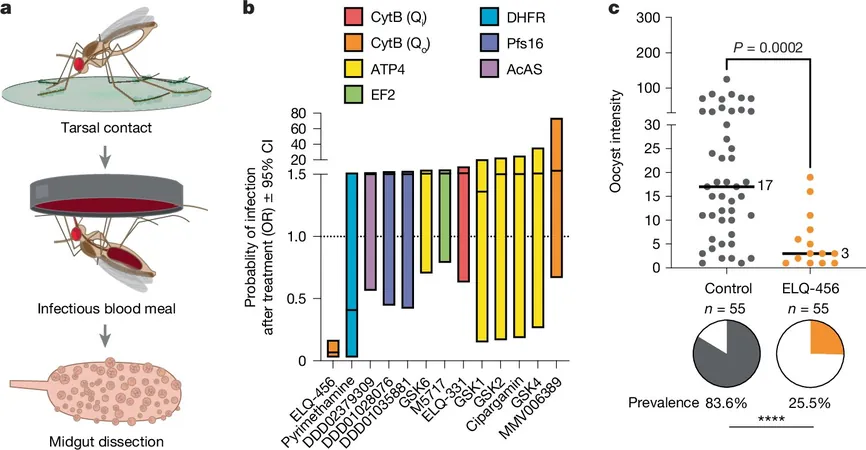
Breakthrough in Fighting Malaria: Drug-Infused Nets Target the Source of Infection!
2025-05-24
Author: Ming
A Revolutionary Approach to Malaria Control
In a groundbreaking study published in *Nature*, researchers have discovered a powerful new method to combat malaria by treating bed nets with a special chemical compound. This innovative strategy aims to kill the malaria parasites inside mosquitoes, instead of targeting the insects themselves.
Prestigious Research Collaboration
The research involved a collaborative effort from multiple institutions, including vital contributions from Oregon Health & Science University (OHSU) and the National Institute of Allergy and Infectious Diseases. Led by Dr. Michael Riscoe, a molecular microbiologist at OHSU, the study showcases the development of endochin-like quinolones (ELQs)—a new class of experimental anti-malarial drugs.
Dr. Riscoe commented on the innovative idea of integrating anti-malarial drugs into bed nets, stating, "The goal is to eliminate the parasites that cause malaria without harming the mosquitoes. Our findings prove that this method is effective.”
The Malaria Crisis Persists
Despite substantial progress in reducing malaria cases over the past two decades, recent years have seen a troubling resurgence in infections, largely due to the rise in insecticide resistance among mosquito populations. In 2023 alone, there were an alarming 263 million new malaria cases and over half a million deaths worldwide.
"Insecticide resistance threatens our most efficient control mechanisms," warns Alexandra Probst, the study’s lead author and a Ph.D. candidate at Harvard. By striking at the root—the malaria-causing parasites—we can bypass this resistance and further diminish the disease's spread.
ELQs: A Game Changer?
Through rigorous screening of 81 compounds, Catteruccia’s lab identified two promising ELQ drugs that showed remarkable efficacy even when integrated into mosquito net materials. Their research indicated that mosquitoes landing on these treated nets could be 'disinfected', effectively curing them of the infection.
As Mike Rubal, a scientist involved in the research, explains, "If an infected mosquito lands on netting with ELQs, it absorbs the treatment via its legs, effectively eliminating the parasites. This could transform our malaria prevention tactics!"
Next Steps in the Fight Against Malaria
The next phase of testing involves deploying these innovative ELQ-treated bed nets in real-world conditions, set to commence later this year. Dr. Riscoe emphasizes the potential of this method, stating, "This work could significantly hinder malaria transmission and become a crucial element in our mission to eradicate the disease globally."


 Brasil (PT)
Brasil (PT)
 Canada (EN)
Canada (EN)
 Chile (ES)
Chile (ES)
 Česko (CS)
Česko (CS)
 대한민국 (KO)
대한민국 (KO)
 España (ES)
España (ES)
 France (FR)
France (FR)
 Hong Kong (EN)
Hong Kong (EN)
 Italia (IT)
Italia (IT)
 日本 (JA)
日本 (JA)
 Magyarország (HU)
Magyarország (HU)
 Norge (NO)
Norge (NO)
 Polska (PL)
Polska (PL)
 Schweiz (DE)
Schweiz (DE)
 Singapore (EN)
Singapore (EN)
 Sverige (SV)
Sverige (SV)
 Suomi (FI)
Suomi (FI)
 Türkiye (TR)
Türkiye (TR)
 الإمارات العربية المتحدة (AR)
الإمارات العربية المتحدة (AR)